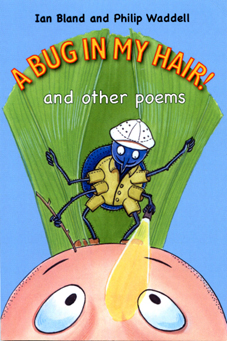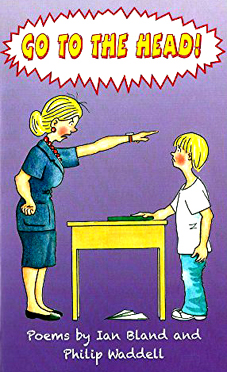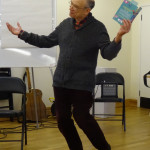Hi Philip. Let us begin at the beginning. When did you start writing?
As a young child I loved stories and remember thinking that one-day it would be fun to be a writer. In my late teens I did write a few chapters of a science fiction novel but abandoned it when I realised it was basically a rewriting of my then favourite TV show, Star Trek. Although I enjoyed poetry at school it didn’t occur to me to try writing a poem myself until I was well into my thirties.
Why do you write poetry?
I like travel and adventure and when I put pen to paper to write a poem I’m setting off on an adventure. Poems often take me to places I would never have dreamed of, places often much more interesting and surprising than the destination I might have had in mind when I started the poem. And when I write a poem I’m happy with, the sense of pleasure I get is just about the best feeling there is.
I try to vary the types of poems I write but get lots of fun out of writing short, humorous verses such as this one.
Little Raindrop
Little raindrop, pitter-pat
Just been born, so small and cute
Little raindrop, pitter SPLAT!
Shame you had no parachute
Do you write anything other than poetry?
I like picture books so would love to be good at writing them. I have been working on a couple of ideas that seem promising. Only time will tell.
How long does it take to write a poem?
Some poems, even quite long ones, know exactly what they want to say and how they want to say it. Although incredibly rare, when this happens it’s almost like taking dictation. Often I find that poems, even short ones, can take ages, years even, to get right. Sometimes, even after a poem’s been published, I find myself tinkering with it. Somebody said that a poem is never really finished, it is abandoned, and I think there’s a lot of truth in that.
What is the most unusual event that inspired you to write a poem?
I don’t know about ‘most’ unusual but one day I was driving past a newly ploughed field and found myself thinking about all the poor worms that must have been chopped in two. This got me thinking about names that might be chopped in two. I very quickly thought of Patrick. Those two thoughts led to this rhyme:
Split Personality
Patrick the worm’s not his usual self,
He got chopped in two with a pick –
So his front half is now known as Pat
And his other half’s now known as Rick.
Do you only write funny poems?
No, sometimes I’ll try to write in another mood. One ‘serous’ poem that I’m pleased with and that occurs to me right now is:
Blessings
The bout of ‘flu,
The broken bone,
The out of order telephone;
The missed coach trip,
The delayed plane,
The punctured tyre,
The cancelled train.
The aisle and not the window seat,
The kid you didn’t want to meet,
The failed exam,
The second prize…
Sometimes they’re hard to recognize.
How do you write your poems?
Often, as with Split Personality, a silly thought might inspire me but it could be something I’ve heard, read or seen that gets me jotting. Sometimes I’ll get an invitation to submit poems on a topic for consideration for an anthology. Often I’ll just decide to write a poem about a subject I’ve plucked out of thin air and see what happens. Trying to write a poem can be like digging for treasure. The following poem started with the idea of looking for an idea.
Miner Poet
Here’s a dazzling diamond,
A wine red ruby,
A glistering nugget of gold;
See, mining words is easy.
But before you drop everything
To become a poet be warned!
The toil comes in unearthing
That precious gem, the brilliant idea.
Sometimes it helps when I’m writing a poem to decide on a form for it and there are so many to choose from. Rap, rhyme, free verse, acrostic, haiku, cinquain, kenning, limerick, shape, list, sonnet and many, many, more. Sometimes the subject of a poem will suggest its own form and often the form of the poem will help in the writing. For example, when writing in rhyme, a rhyme might suggest a completely unexpected direction for a poem to take.
Do you have a special time to write?
No, I just jot down the ideas when they come. Noting the ideas is very important because it doesn’t matter how great an idea might seem when it arrives I’d be sure to forget it if I didn’t write it down immediately. When I look at old notebooks I see lots of long forgotten ideas that I wouldn’t know were mine if I didn’t recognise my own inimitable scribble.
Are you writing anything at the moment?
I’m always writing. Right now I’m working on an idea I hope will become a published collection. All will be revealed if it comes to anything.
Do you visit schools?
I have visited a few though not recently for reasons partly to do with my wife’s job, which has sometimes taken us overseas for extended periods. I am thinking of making school visits again for the fun of it and because I enjoy running poetry workshops.
Who are your favourite poets?
When I started writing some of my favourite children’s poets were Ogden Nash, Dr Seuss, Shel Silverstein, Colin McNaughton, Charles Causley, Roger McGough and Eleanor Farjeon. But now there are so many more. A bonus for me is that some of the poets whose work I’ve come to know and like have become friends. I won’t name them though because I don’t want to embarrass them or myself.
Of all the poems you’ve written, which is your favourite?
I don’t have a favourite. I think most poets would say their most recent. I’m wary of this because, sometimes, after a couple of days of feeling particularly pleased with a new poem I’ll change my mind and wonder if it’s any good at all.
What did you do before becoming a poet?
Quite a few casual jobs, mostly when hitch hiking abroad as a young person. Factory work, sign writing, cleaning, fruit picking, farm labouring – but mostly I worked as a laboratory technician. Eventually I became a sales representative, visiting lots of doctors’ surgeries, research institutions and hospitals. Actually I wrote lots of poems during my time in sales because between visits there was lots of driving and ‘miles’ of thinking time to come up with poems.
What advice would you give to young poets?
If you’re already a poet you’ll know that poems can be great fun to write and also a great way to express your feelings. And importantly, poems needn’t be written for anyone else to see.
Reading lots of poetry will cultivate a feel for how to write it. It also pays to read ‘How to’ books. Three very good ‘How to’ books, if you can get hold of copies, are:
What Rhymes With Sneeze?, by Roger Stevens, Published by A & C Black
The Unidentified Frying Omelette, by Andrew Fusek Peters, Published by Hodder Wayland
and So You Want to Write Poetry, by Brian Moses also by Hodder Wayland.
The main thing is to enjoy your writing and keep at it.
Thanks, Phil. If you’d like to read more of Phil’s poems, look out for these two books. Highly recommended.
 pppp
pppp





